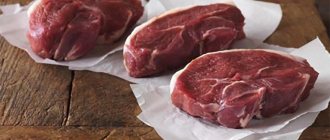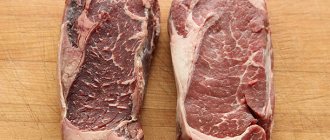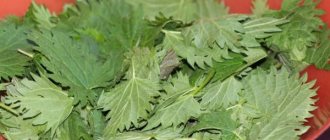Meat for shish kebab
Meat consists of muscle fibers and connective tissues. A good kebab is when a piece of meat enters our mouth:
- easy to chew without requiring significant effort;
- juicy. When pressed, a significant portion of the meat juice is released;
- fragrant.
It is these components that determine the taste.
The percentage of tight compounds in meat depends on:
- type of animal;
- age;
- morphological structure of muscle tissue.
Everyone knows the fact that it is impossible to make tasty kebab from an old sheep.
In order for the meat to be soft, tender, and juicy, you need to help the dense muscle fibers become less dense, and the connective tissue is completely transferred to a different state.
Meat tenderization occurs when collagen is converted to glutin. During culinary processing, 30-40% of collagen undergoes a biochemical transformation. True, if the temperature is above 100 ᵒC (this is possible when autoclaving meat) this percentage is much higher. When cooking barbecue, it is impossible to achieve such a temperature.
What about the remaining percentages? They need help. How? Use marinade.
Mineral water as a base for marinade
Experts say that mineral water breaks down meat fibers very well and, thanks to this, kebab “in mineral water”, acquiring incredible juiciness and softness, always turns out successful. To prepare such a marinade, it is important to choose high-quality mineral water.
Rodnikovaya mineral water is extracted from a spring popularly called “Gods’ Key”. It is located in a protected area of the Kostroma region, not far from the legendary Susaninsky forests. Due to its natural purity, complete absence of iron and balanced mineral composition, Myasnov BUFET spring water does not require chemical purification. That is why the structure of water does not change, and it retains its wonderful taste and unique qualities. Spring water has optimal mineralization and a unique natural composition.
What is marinade
Marinades have existed since the era of Ancient Egypt and on all continents. Initially, the purpose of pickling was to preserve the product. That is, they looked for substances that could kill the microflora that contributed to the spoilage of the product.
Marinade is used not only for meat, but also for preserving vegetables. Anyone who has made preparations knows that if marinades are used correctly, such products can be stored without refrigeration.
The word “marinade” appeared in Europe in the 17th century. During this time, increased maritime trade made oriental spices more accessible to Europeans, which likely led to the creation of new recipes. “Marinade” comes from the Latin word mare - “sea”, but whether this is connected with sea water (aqua marina), which was sometimes also used for preserving meat, or with the overseas origin of some components of the marinade is unclear. Over time, marinades began to be used not only for food preservation, but also simply in cooking: it became clear that:
- some components of the recipe make the meat more tender;
- others are more fragrant;
- still others perform both functions at once.
To convert meat collagen into the soluble substance glutin, an acidic environment is needed; it accelerates the breakdown of collagen. This is the basis for marinating meat, stewing it with sour sauces and seasonings.
When heated, meat containing stable collagen remains dense and tough, since the moisture in the meat evaporates faster than the conversion of collagen into gluten occurs. And by converting insoluble substances into soluble ones even before heating, we enable the meat to be tender and soft.
Preparing the marinade
Preparing a marinade for meat is a creative and spontaneous process, so you can use any spices that you like and seem suitable for this particular meat. Any spices and dried herbs, various sauces, vinegar, vegetable oil, sugar, honey, syrups, alcoholic drinks, kefir, yogurt, sour cream, mayonnaise, tomato paste and fruit juices (mainly pomegranate, apple, tomato, grape, lemon or orange). The main thing here is to take into account that too much acid can lead to dry meat.
You can also add greens, onions, garlic, ginger, tomatoes, hot and sweet peppers and other vegetables to the marinade. Sour berries and pieces of fruit - pineapple, kiwi, papaya and citrus fruits - give the marinade a pleasant taste. Before marinating, be sure to taste your marinade - if it tastes good, the meat will taste good too!
How to prepare the marinade
To create an acidic environment we need acid. For this purpose, it is customary to use organic acids. You can prepare the marinade using:
- acetic acid (table and fruit vinegar);
- dairy (kefir, yogurt, whey);
- fruit (all sour fruits and berries: red currants, lemon, rhubarb);
- wine (wine and wine materials).
What does acid do? In its presence, long protein threads break up into shorter ones. This allows them to be better rubbed with teeth, and stomach enzymes will quickly break down into digestible amino acids.
Dry marinades for meat
Classic vegetable marinade
You will need:
- two carrots;
- two onions;
- five cloves of garlic;
- 100 g peeled walnut kernels;
- two tablespoons of tarragon and parsley;
- 50 g butter.
You can effectively marinate meat for barbecue using a classic marinade, popular in pre-revolutionary Russia. For it you need to finely chop carrots, onions, grind garlic cloves and walnut kernels through a press. Also chop the parsley and tarragon as finely as possible. Mix all.
Then add softened butter. Mix everything thoroughly. The prepared marinade can be used for any meat and poultry.
At what temperature should you marinate meat?
Experience shows that marinating processes are most effective at a temperature of 4-6 ᵒC. This means that the meat needs to be marinated in the refrigerator.
However, the marinating time must be kept within 24-30 hours. It is during this period that biochemical reactions are able to prepare the product for heat treatment. When planning to cook barbecue, do not rush. Choose the meat carefully, marinate, wait for a while and only then use the skewers.
So why wait so long? And if the forest is already calling, beckoning with fresh green grass? Then the process can be speeded up.
Marinade with mint
Mint will give the kebab a piquant taste. If you want to try something new, then prepare the following ingredients:
- mint - 3 bunches;
- onions - 3–4 pcs.;
- salt, pepper - to taste.
Then prepare it like this:
- Take a saucepan and line the bottom with mint.
- Chop the onion and meat. Mix the ingredients, add salt and pepper, stir.
- Place the meat in layers in a pan, alternating with mint leaves. Spicy herbs complete the rotation.
- Leave to marinate for 3-4 hours.
Cooked kebab in mint marinade: Pixabay
Now you know how to surprise your loved ones with the unusual taste of kebab for the May holidays. Write down one of the suggested recipes and cook for health!
Original article: https://www.nur.kz/food/recipes/1790886-kak-marinovat-saslyk-8-proverennyh-variantov/
How to marinate meat quickly
For quick marinating, you need to choose the optimal temperature. And if this is impossible, increase the temperature.
If you need barbecue in the evening:
- heat the water for the marinade to lukewarm;
- dissolve all the ingredients in it;
- pour over meat;
- leave at room temperature.
Have you changed your mind or is it raining? No problem, put the pan in the refrigerator. Meat can be stored in the marinade for 24-30 hours.
When to salt
You can read a lot that salt will dry out the kebab. It is not always so.
First of all, let’s remember why this happens (when it happens): liquid is required to dissolve the salt and in some types of marinade it is impossible to take it (liquid) somewhere else other than from the meat.
This is not true for liquid marinades.
In enveloping marinades, salt draws some of the juices out of the meat, but when frying, this type of marinade retains juiciness more than any other type.
In sour marinades, yes, the salt dries out the meat. This is one of the reasons why you need to choose fatty meat for such marinades.
If you are making large kebabs, then salted kebabs just before grilling (and some people advise salting just before serving) simply won’t be salted deeply. There will be a very salty crust and a bland middle.
Salt is a flavor enhancer: the taste of meat and spices. We like the salty taste itself. And choosing an impeccable taste and a slightly dried kebab, and a little juicier, but with an unfinished taste, we choose the first option.
The juiciness of pork kebab will be more affected by the quality of the meat and the type of cut, and not by when you add salt.
What to marinate meat in
Mineral water is less acidic compared not only to wine, kefir and vinegar, but also to the characteristic acidity level of muscle fibers. This will also partly contribute to the denaturation of actin and myosin: disruption of the native tertiary structure of the protein occurs with any deviations from the pH value, which is the “working” value for this protein.
However, the main factor ensuring the denaturation of proteins during pickling in mineral water is the ionic strength of the mineral water. The content of soluble salts in water, which dissociate into ions during dissociation, is higher than in the cellular and extracellular fluids of muscle tissue, and salt ions are also a factor of denaturation.
Soaking meat in water containing less soluble salts than muscle tissue (boiled water, deionized water), on the contrary, will reduce the water content in the meat due to the same osmosis. In order for the concentrations to equalize, the salt-containing fluid from the muscle fibers will flow out into the water, leading to a decrease in the water content in the meat, and the kebab will become tough even before the meat is cooked and suitable for eating.
Kefir marinade
Meat marinated in kefir differs significantly in taste from similar dishes cooked in another sauce. Kefir will soften the fibers of the main ingredient, making biting the meat easier and more enjoyable.
Kefir marinade for kebab goes well with pork. If desired, you can replace the dairy product with yogurt. To prepare, take the following products:
- pork meat - 2 kg;
- low-fat kefir - 1 kg;
- cilantro - 1 bunch;
- onions - 4 pcs.;
- salt, pepper - to taste.
Marinated meat recipe
Some recipes advise adding a little vegetable oil to the marinade - and this can also be explained from a chemical point of view. Mono- and diglycerides of fatty acids, which are part of many vegetable oils (primarily olive), are emulsifiers and can facilitate the passage of marinade components through cell membranes, thus making the process of saturating meat with spices and water faster and more effective.
You can use sunflower oil with the same success - anyway, the acidic environment of the marinade will promote the hydrolysis of the fats it contains and partially convert fatty acid triglycerides into di- and monoglycerides. The same fate will await triglycerides from animal fats. In addition, some components of herbs and spices - esters, terpenoids and other non-polar substances - dissolve better in oil.
It is recommended to add vegetable oil to marinades for poultry, fish or very lean red meat. If you use pork or lamb “with fat” for barbecue, there is no need to spend vegetable oil on the marinade.
Spices, seasonings, vegetables, herbs
It's time to add spices, vegetables and herbs to the marinade to further flavor the meat and give it a unique taste.
When preparing a marinade, it is important to choose the right spices depending on the type of meat you are using.
| The best ingredients for beef are dill, thyme, oregano, basil, rosemary, tarragon, pepper (allspice, black and red), turmeric, cumin, coriander, mustard seeds, marjoram and cloves. |
| For lamb, use rosemary, coriander, paprika, cumin, mustard seeds, garlic, anise, red and black pepper, nutmeg, tarragon, thyme, oregano, saffron, ginger and mint. |
| Pork goes well with all types of peppers, garlic, cumin, cardamom, sage, nutmeg, basil, celery seeds and marjoram. |
| A mixture of curry, thyme, marjoram, rosemary, sage, thyme, and basil are perfect for chicken. |
| Turkey goes well with a mixture of curry, mustard, sage, rosemary, cumin, cloves, coriander, basil, and cinnamon. |
Our marinades do not contain any substitutes, flavor enhancers or artificial flavors. As a matter of principle, we do not use ready-made spice mixtures, but rather develop the recipes ourselves and carefully check the balance of ingredients in each marinade. To prepare marinades, use only natural spices and Myasnov BUFET herbs of the highest quality from regions that are especially famous for their spices.
We especially recommend the Spanish paprika Pimenton de Murcia, which is produced in only two regions of Spain - Extremadura and Murcia, including smoked paprika, the analogues of which you will not find in any country in the world. To create it, peppers are dried and smoked over oak sawdust, resulting in a seasoning that smells like a campfire and willingly gives off its smoky aroma to the dishes to which it is added.
And if you are preparing a marinade that contains, for example, onions or lemon, we are waiting for you at Myasnov for fresh vegetables, fruits and herbs. Only the best, passing through our Quality Service and independent laboratory, end up in stores.
Spices for marinated meat
If you are at a loss, start with any. Can be used:
- oregano;
- rosemary;
- basil;
- tarragon;
- thyme;
- savory;
- hyssop;
- Bay leaf;
- allspice and bitter peppers.
Each plant will bring its own aroma to the bouquet. You can use ready-made “Kebab” seasonings, but no one is responsible for the result.
I don't really like rosemary, it smells like pine. Eating a shish kebab near the Christmas tree is one thing, but with the Christmas tree is another. But don't mind me - this is just my opinion.
Onion. He brings his own touch. After marinating, many people eat it even raw, and no one will refuse onions on a skewer.
Experiment.
How and how much to fry shish kebab
Now about the frying. Skewers should only be laid out when there is good heat. They need to be turned over periodically. Always make sure that the fire does not flare up and splash the pieces. Wait until the coals burn thoroughly, shake off the ashes and only then proceed to this true art - frying. If you grill shish kebab on a grill that is made with the right holes, then when juice drips from the meat onto the coals, it will not flare up. Fried and rosy meat melts in your mouth, you will understand this when you fry your kebab on the right grill and after proper preparation.
Let's talk about lamb. You know how to properly marinate lamb kebab. But that is not all. Be extremely careful when frying it. It is easy to dry it over fire. A juicy dish can turn into a dry and rough ball in an instant. Fresh lamb shish kebab is prepared very quickly. 5-10 minutes of good heat is enough. Many people confuse the juice from fried meat with blood and want to fry everything thoroughly, although the meat on the skewer is already ready. Keep everything in moderation. If in doubt, remove another piece to test.
There is such a tradition. When the coals are lit, they fry one single stick, so to speak “for testing”. This allows you to evaluate the quality of the kebab and record the time it was fried. In addition, in this way, many tease their guests so that they burn with impatience and anticipation of each subsequent game.
Surprise your guests, offer them shish kebab using this recipe and you will see from your own experience that it, and you too, will forever forget how to marinate in tomatoes, mayonnaise and other experimental ones.
How to marinate meat for barbecue
If we cook boiled pork by dry salting, then for barbecue I prepare a liquid marinade. The step-by-step cooking process can be described as follows:
- Place herbs at the bottom of the pan or bowl.
I have fresh branches of oregano (oregano in Russian, maternaka in Ukrainian). Oregano means Origanum vulgare in Latin. The Italians call it pizza weed (I like it better with parsley). But for the marinade, that’s all. If you have a piece of land, plant a fragrant plant. - The second layer is chopped onion into rings.
- Next is the chopped meat.
I take the neck, but bone-in shish kebab also turns out excellent. - Another layer of herbs.
If you don't have fresh ones, use dry ones.
Marinade for meat
In a mug with tap water I dissolve (per 1 liter):
- salt - 60 g;
- sugar - 100 g;
- vinegar - 50 g. Sometimes I replace it with citric acid (1 teaspoon).
Let's try. It should have a pleasant sweet and sour taste with noticeably pronounced saltiness. Pour in the meat.
Cover with a plate or lid so that the marinade is above their surface. If there is not enough liquid, cook a little more in the indicated proportions.
If you need the meat for tomorrow, then I leave the pan at room temperature for 1-2 hours, and then put it in the refrigerator. When marinating ahead of time, I immediately put it in the refrigerator. There was a case when meat was stored for 4 days - the kebab was excellent.
Sauces for meat marinade
One year we had a huge apricot harvest. And the farmer, as you know, has two problems: the harvest and the non-harvest. So that year everyone had a lot of apricots. It's a shame to throw it away. It was decided to make wine.
They put little sugar into the wine (there was zero experience at that time), the technology was broken, and the wine successfully turned into vinegar. However, the aroma was unsurpassed. The product was not disposed of, but was used to marinade meat. How to marinate meat with apricot vinegar? The same as with ordinary, to your taste.
The marinade with this apricot vinegar was very tasty.
The kebabs were always a great success. Now we are waiting for the harvest to repeat the masterpiece.
Beef marinade
For barbecue, it is best to use the thick edge of a bone or part of the back of an animal (tenderloin or thin edge). Here are located those muscles that do not take much part in movement. With such meat, the kebab will turn out juicy and soft.
Beef must be checked before purchasing and cooking. There should be no mucus, blood, unpleasant odor, or sticky surface. No dents should appear when pressed.
Now let’s look at how to marinate shish kebab. Use the recipe with yogurt and soy sauce. Take these products:
- beef - 2 kg;
- bulbs - 5 pcs.;
- soy sauce - 3 tbsp. l.;
- natural yogurt - 4 tbsp. l.;
- salt - to taste.
Start cooking:
- Finely chop the cilantro and the onions into rings.
- Cut the beef into equal cubes with sides of 4 cm. Place the meat in a saucepan.
- Mix all of these ingredients with pieces of beef. Remember with your hands.
- If the meat is young, then leave it to marinate for a couple of hours or put it in the refrigerator for at least 6 hours.
Marinade for shish kebab with yogurt: YouTube/Dimonych
LAMB SHASHLIK
Lamb kebab is considered a classic of the genre and the ancestor of this dish in general. However, it is the most difficult to prepare due to the specificity of the meat. The best option is tender milk lamb (available only in spring). The meat of young lambs up to one year old is also suitable - it is distinguished by its red tint, white, elastic fat and the absence of a specific smell. The meat of old animals - dark, with yellow fat, tough and stringy - may be suitable for pilaf, but it is not advisable to use it for barbecue.
In red wine
You will need (for 1 kg of lamb):
onions - 3 pcs., milk (for soaking) - 1 l, bay leaf - 4 pcs., black pepper (peas) - 15 pcs., lemon - 1 pc., red wine dry - 1 glass, sugar - 3 tsp, salt - to taste.
Peel the onion and cut into large rings. Squeeze the juice out of the lemon. Crush the peppercorns with the flat side of a knife. Rinse the lamb (pre-soaked in milk), trim off excess fat, and dry with a paper towel. Cut the meat into equal pieces across the grain and lightly salt. Place in a saucepan, add onion rings, pepper, lemon juice, bay leaf, sugar and wine. Mix everything carefully and marinate in the refrigerator overnight.
In mustard marinade
You will need (for 1 kg of lamb):
milk - 1 l, mustard (paste in a jar) - 120 g, soy sauce - 1 tbsp. l., vegetable oil - 1 tbsp. l., lemon - 1 pc., garlic - 1 clove, parsley - 1 bunch.
Rinse the lamb, previously soaked in milk, dry with a paper towel, remove excess fat and film, if necessary. Squeeze the juice out of the lemon, and pass the zest and pulp through a meat grinder. Crush the garlic in a press. Finely chop the parsley. In a saucepan, mix mustard, soy sauce, vegetable oil, lemon juice and pulp, chopped garlic and parsley. Place the meat in the marinade and mix thoroughly. Place in the refrigerator overnight.
Place two barbecue connoisseurs at a grill and you will see the hottest debate. There are several dozen marinades for barbecue alone, and there are even more ways to cut meat and put it on skewers. Some people cook meat without pre-processing, while others pour vinegar, kefir, ayran, mineral water, wine and even Coca-Cola into the meat.
Main types of marinades
The marinade is used to prepare kebabs for heat treatment - different types of meat are soaked in it. The basis is products with vegetable oils and food acids - vinegars, wines, mineral water, oils, vegetables, etc.
Thanks to oils, the juiciness of a piece of meat is preserved, while acids make it tender. Mineral water makes it possible to replenish the loss of juiciness, especially when the meat has been frozen.
To make the best marinade for barbecue, you need to follow some simple recommendations. Based on them, choose a specific recipe.
Different meats require different marinades. Lemon juice is considered universal, as it will give the dish a pleasant rich aroma with an unobtrusive sourness. Shish kebab in lingonberry marinade turns out very tasty.
The most suitable food acids are pomegranate juice, sour milk, and unsweetened wine.
In many recipes you can see vinegar as a component of the marinade - it should be noted that very often it does not become the most advantageous base for barbecue. Yes, vinegar will soften the meat and preserve its juiciness, but most likely it will give it a sharp and not always pleasant taste. It is better to use vinegar only according to proven recipes and not experiment with this ingredient.
The lightest and most delicious marinade is dry wine, which is also often replaced with beer. Alcohol promotes maximum softening of meat, after which it becomes very tender and acquires a beautiful shade during frying. But you should not add additional lemon juice or vinegar to the alcoholic marinade - you can overdo it and the meat will lose its unique taste.
- Marinades are classified by type of meat. For each type there are more suitable recipes:
- For pork and beef - marinades with alcohol.
- For lamb - with yogurt and kefir. Lamb is a capricious meat, and if the ingredients are chosen incorrectly, the specific taste and aroma intensifies, becoming unpleasant.
- Chicken is almost never marinated in wine; it is already tender. For her, the ideal option is mayonnaise with onions and garlic, as well as other seasonings to taste. Chicken kebab in sour cream marinade turns out delicious. Blends based on citrus and other fruits also work well.
- For vegetables or fish, it is best to give preference to lemon juice, olive oil or white wine. It is enough to marinate fish and vegetables for no more than 20 minutes.
The simplest and most delicious types of barbecue marinades are:
- marinade with vinegar and onions;
- spicy marinade with spices and mayonnaise;
- lingonberry marinade for barbecue;
- wine marinade;
- onion marinade for shish kebab from pork and any other meat, otherwise it is called dry, since besides onions and seasonings there are no liquids in the recipe;
- marinade with fermented milk products - kefir or yogurt;
- marinade with lemon juice;
- soy sauce marinade;
- marinade with sparkling mineral water.
BEEF SHASHLIK
Beef kebab is preferred by two types of people - those with strong stomachs and those with weak stomachs (those for whom fatty foods are contraindicated).
In the latter case, the meat should be marinated very carefully with a large amount of dry wine and other “tenderizers”. It is even advisable to beat it off before marinating. Beef is cut across the grain rather than along it - this, among other things, will make it easier to chew. A “lighter” version of beef kebab is veal. Since both types of meat have virtually no fat, when frying, you can spray the pieces with vegetable oil to prevent the surface from drying out.
In mayonnaise
You will need (for 1 kg of beef):
mayonnaise - 300 g, lemon - 1 piece, garlic - 5 cloves, black pepper (peas) - 1 tsp, ground black pepper - 1 tsp, salt - 0 .5 tsp.
Grate the lemon zest on a fine grater, squeeze the juice out of the lemon, and extract the pulp. Peel the garlic and grate it on a fine grater. Mash the black peppercorns with the flat side of a knife. Mix lemon pulp, zest, juice and grated garlic with mayonnaise, mix everything thoroughly. Rinse the meat, dry with a paper towel, cut into pieces (across the grain), add a little salt, pour in the mayonnaise mixture, mix thoroughly. Place in the refrigerator to marinate for 10 hours.
In kefir with kiwi
You will need (for 1 kg of beef):
kefir - 0.5 l, kiwi - 2 pcs., onions - 2 pcs., parsley - 1 bunch, ground pepper, salt - to taste.
Rinse the meat, cut into equal pieces. Place in a bowl, pepper, lightly salt, leave for 10 minutes. Chop the onion thinly and mash it slightly with your hands to release its juice. Mix with beef, pour kefir over everything so that the meat is completely covered. Cover with a lid and refrigerate for 10 hours. After this time, peel the kiwi and grate it on a fine grater (do not drain the juice). Add to the meat, stir and leave for another 1.5 hours. When frying, sprinkle the kebab with the remaining kefir marinade.










